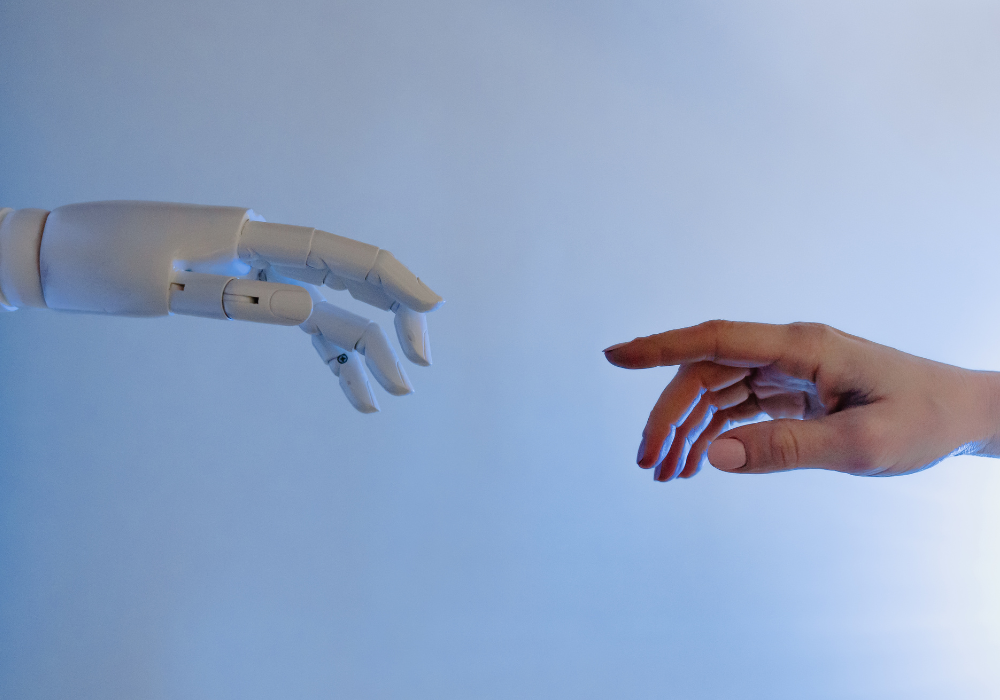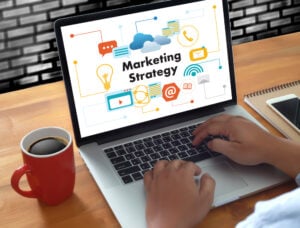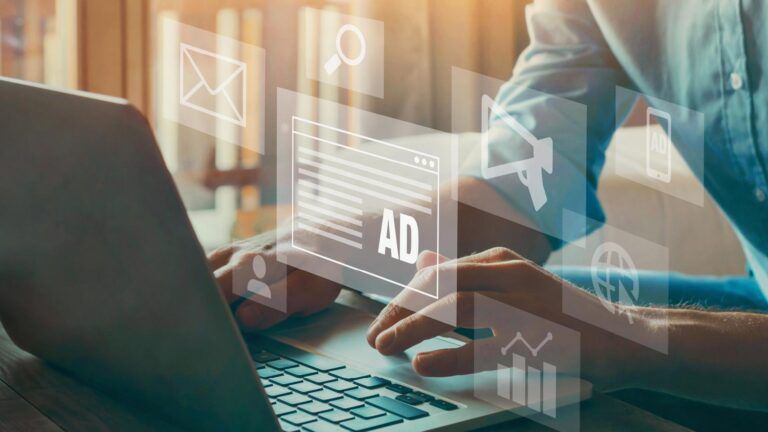10 Ways AI Technology Is Changing the Future of Digital Marketing

Due to its ability to quickly and accurately analyze and interpret massive amounts of data, artificial intelligence (AI) has quickly become a crucial tool for digital marketers.
Generally speaking, AI technology has the potential to revolutionize digital marketing by increasing individualization, productivity, and impact. As AI develops further, novel applications of this technology in digital advertising are likely to emerge.
This article covers 10 ways in which AI technology is being used in digital marketing:
1. AI-Powered Personalization
AI algorithms can personalize content based on customer browsing behavior, demographics, and preferences. AI can help marketers personalize content, offers, and ads. This improves user experience and helps businesses create more targeted and effective marketing campaigns that increase conversion.
AI can improve digital marketing personalization in the following ways:
- Marketers can send personalized offers and product recommendations to customers by analyzing their past behavior with AI.
- AI lets companies track customers’ browsing habits and recommend products in real time.
- AI-powered chatbots can recommend products and answer questions quickly.
- AI can analyze customer viewing patterns and recommend videos or visual content.
- AI can analyze social media, product reviews, and surveys to help brands personalize.
2. AI-Powered Chatbots
AI-powered chatbots can support digital marketing campaigns by providing personalized customer support, collecting data for lead generation and analysis, and increasing engagement and customer satisfaction.
generation and analysis, and increasing engagement and customer satisfaction.
Digital marketing campaigns can benefit from AI-powered chatbots in the following ways:
- Chatbots improve customer service and reduce support team workload by providing 24/7 support, thereby improving satisfaction and brand loyalty.
- Chatbots can converse with users, increasing engagement and time spent on a website or social media platform.
- AI-powered chatbots can recommend products, provide personalized recommendations, and offer discounts or promotions based on user behavior and preferences.
- Chatbots can collect email addresses and phone numbers for lead generation and marketing.
- Chatbots can analyze user data to find trends and insights to improve marketing campaigns and target users.
3. Predictive Analytics
AI algorithms help marketers understand customers. Machine learning algorithms can analyze large amounts of data from social media, website analytics, and customer feedback.
This data can predict customer behavior and identify trends like product purchases and churn. It can also help improve products and services, inform marketing strategy, and boost marketing campaigns.
AI-powered predictive analytics can help digital marketers make better data-driven decisions in the following ways:
- Targeted advertising: Predictive analytics can identify patterns in user data and predict which users will be interested in a product or service. This data can improve advertising targeting and conversion.
- Personalized content: Predictive analytics can analyze user behavior and preferences to create engaging brand-loyal content.
- Customer retention: Predictive analytics can help retain high-churn customers. This data can be used to create more effective targeted retention campaigns.
- Product development: Predictive analytics can identify user data trends and insights to improve product development and user experience.
- Forecasting: Predictive analytics uses machine learning algorithms to predict customer behavior and trends. This data can improve marketing and resource allocation.
- Customer satisfaction: Marketers can improve customer satisfaction and loyalty by using AI-powered predictive analytics to better understand user behavior and preferences.
4. AI-Generated Content
AI technology can help marketers save time, improve content quality, and boost campaign performance based on data and user preferences, AI-powered content creation tools can create more engaging and relevant blog and social media content.
Digital marketing campaigns can benefit from AI-powered content generation tools in the following ways:
- AI-powered content generators save time and money. AI-powered content creation tools can write product descriptions, blog posts, and social media content.
- AI-powered tools can customize content based on user behavior. A chatbot can use AI to personalize responses based on a user’s past brand interactions.
- Performance data can optimize content using AI. An AI-powered tool can analyze which headlines or images get the most clicks and adjust content.
- AI-powered tools can edit and proofread content for grammar and spelling errors, making it professional.
Also Read: What is SEO Content? Decode the Future of AI in Content Marketing
5. AI-Targeted Ads
AI algorithms can identify patterns in user data and predict which users will engage with specific ads. This provides deeper insights into customer behavior, personalizes messages, predicts future behavior, and optimizes campaigns in real time, helping businesses target their advertising.
AI can improve advertising targeting in these ways:
- AI algorithms can identify patterns and trends in large data sets like customer behavior, purchasing habits, and demographics. This analysis can help companies choose the best advertising audience.
- AI-based personalization can tailor advertising to customer preferences and behavior. Businesses can improve advertising by sending customers personalized messages.
- AI-powered predictive modeling algorithms can predict customer behavior from historical data. Businesses can target their advertising to customers most likely to respond.
- AI-based real-time optimization technology can monitor the performance of advertising campaigns in real-time and make adjustments on the fly to optimize the effectiveness of the campaign. For example, AI can adjust the targeting or messaging of an ad based on how well it is performing.
6. AI-Based Voice Search
 Siri, Cortana, and Alexa are changing how people search for information. Optimizing website content for voice search increases visibility and customer acquisition.
Siri, Cortana, and Alexa are changing how people search for information. Optimizing website content for voice search increases visibility and customer acquisition.
AI-based voice search technology can support digital marketing campaigns by optimizing content for voice search, creating conversational chatbots, creating voice-based advertising campaigns, and analyzing voice search data to improve campaigns.
AI-based voice search can help digital marketing campaigns in these ways:
- Optimize content for voice search: AI-based tools can help businesses understand how people use voice search and what keywords and phrases they use.
- Create conversational chatbots: AI-based chatbots can answer users’ questions quickly and easily. Businesses can use chatbots for customer support, FAQs, and sales funnel guidance and have Siri, Alexa, and Google Assistant deliver these ads.
- Analyse voice search data: AI-based tools can analyze voice search data to understand user behavior on their website and products. This data can help businesses spot trends, optimize content, and boost digital marketing.
7. AI-Based Image/Video Recognition
AI can identify objects, people, and other elements in images and videos. Automated tagging, personalization, search functionality, visual content analysis, and creative inspiration.
Here are some ways that AI-powered image and video recognition algorithms can help businesses create more relevant and engaging visual content:
- Automated tagging: AI algorithms can automatically tag images and videos with relevant keywords, making it easier for businesses to search, categorize and create more engaging visual content.
- Search accuracy: AI-powered image and video recognition algorithms can improve search accuracy. This helps companies find visual content for their digital marketing campaigns quickly.
- Visual content analysis: AI algorithms can identify patterns and trends in visual content, helping businesses create better visual content.
- Creative inspiration: AI algorithms can suggest new visual content based on trends and user preferences. This can help companies make more appealing visual content.
8. AI-Powered Fraud Detection
AI algorithms can detect anomalies, use predictive modeling, analyze text-based data, monitor activity in real time, and assign fraud scores to help businesses identify and prevent fraud.
AI algorithms can detect fraud patterns and prevent click fraud and account hacking in the following ways:
- AI algorithms can detect anomalies like multiple clicks from the same IP address or flag any sudden spikes in account activity.
- Predictive modeling: AI algorithms can use machine learning to identify fraud patterns like IP addresses, locations, and device types. These algorithms can then predict fraud and prevent it.
- Natural language processing: AI algorithms can identify fraud-related keywords and phrases in chat logs and email conversations.
- Real-time monitoring: Businesses can detect and respond to fraudulent activity in real-time using AI algorithms. An AI algorithm can alert the account owner when an account is accessed from a new location.
- Fraud scoring: AI algorithms can assign a score to each transaction or activity based on the likelihood of fraud. This scoring system can help businesses to prioritize their response and focus their resources on the most high-risk transactions.
9. AI-Driven A/B Testing
AI-powered A/B testing tools can help companies test and optimize their marketing campaigns to improve performance and reach their goals faster.
AI-powered tools can be used to automate A/B testing in the following ways:
- Test setup: AI algorithms can randomly distribute traffic to a different webpage or ad variations to set up A/B tests. This saves time and money over manual A/B testing.
- Test analysis: AI algorithms use statistical models to determine which variation performed better in A/B tests.
- Test optimization: AI algorithms can use machine learning to identify A/B test patterns and optimize future tests. The algorithm may recommend using certain colors or fonts in future tests based on audience segmentation.
- Personalization: AI-powered A/B testing tools can personalize the test variations based on user data, allowing businesses to test different variations for different segments of their audience. This can help businesses deliver more relevant and engaging experiences to their users.
- Real-time testing: AI-powered A/B testing tools let businesses quickly iterate and optimize their website or ad based on user feedback. This can boost conversions and speed up marketing goals.
10. AI-Powered Marketing Automation
AI-powered marketing automation tools can automate email, social media, and data analysis tasks. enabling businesses to focus on strategic and creative tasks to boost sales, marketing performance, and efficiency.
Digital marketing campaigns can benefit from AI-powered marketing automation tools in the following ways:
- AI algorithms can personalize marketing content based on user data and behavior. This can improve conversion rates and sales by giving customers more relevant and engaging experiences.
- AI predictive analytics algorithms use machine learning to analyze user data and predict which users will convert or take a specific action. This can help businesses focus their marketing efforts on the most likely to convert.
- AI campaign optimization tools can real-time optimize digital marketing campaigns based on user behavior and feedback. The algorithm may automatically adjust paid search ad bids or marketing email content based on user behavior.
- AI lead scoring algorithms can assign a score to each lead based on their likelihood to convert, allowing businesses to prioritize their follow-up and focus their resources on the most promising leads.
- By analyzing customer data and behavior, AI algorithms can provide insights into customer preferences, interests, and actions. Using this data, companies can better target their advertising and gain insight into their clientele.
Emeritus’ Online Digital Marketing Courses
Emeritus’ online digital marketing courses examine how digital economies grow and affect technology, consumer trends, and purchasing behavior.
You can learn how to plan, analyze, curate, and build a long-term online presence, as well as sponsored search, performance marketing, SEO, content marketing, social media marketing, influencer marketing, and other skills with Emeritus online courses in India.





